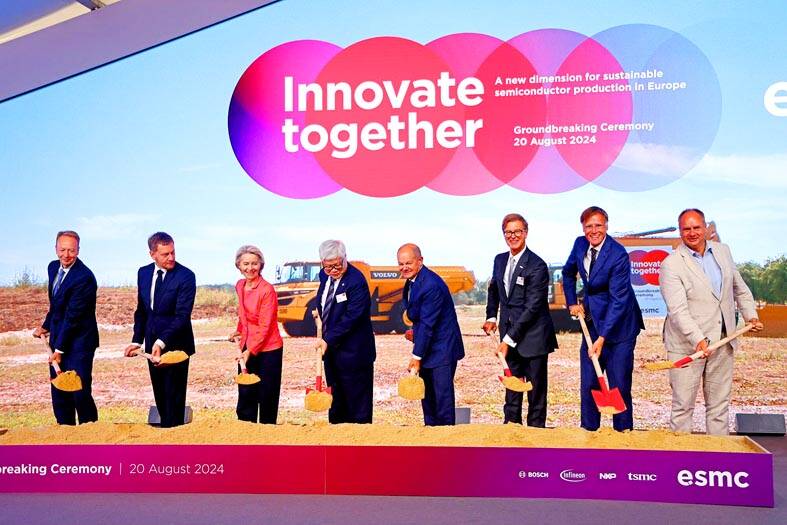Taiwan Semiconductor Manufacturing Co (TSMC, 台積電) yesterday broke ground in Dresden, Germany, on its first European plant as the continent seeks to safeguard its chip supplies amid growing US-China tensions.
TSMC chief executive C.C. Wei (魏哲家) attended the event, together with European Commission President Ursula von der Leyen, German Chancellor Olaf Scholz, and the heads of Infineon Technologies AG, NXP Semiconductors NV and Robert Bosch GmbH, which each hold a 10 percent stake in the venture. TSMC owns a 70 percent stake in the plant.
“Together with our partners, Bosch, Infineon and NXP, we are building our Dresden facility to meet the semiconductor needs of the rapidly growing European automotive and industrial sectors,” Wei said. “With this state-of-the-art manufacturing facility, we will bring TSMC’s advanced manufacturing capabilities within reach of our European customers and partners, which will stimulate economic development within the region and drive technological advancements across Europe.”

Photo: Bloomberg
When fully operational, the European Semiconductor Manufacturing Co plant is expected to have a monthly production capacity of 40,000 12-inch wafers deploying TSMC’s 28-nanometer and 22-nanometer planar CMOS and 16-nanometer and 12-nanometer process technology, further strengthening Europe’s chip manufacturing ecosystem with advanced transistor technology, the chipmaker said in a statement.
The new facility is expected to generate about 2,000 direct high-tech professional jobs.
Each direct job created by the project is expected to stimulate the creation of numerous indirect jobs throughout the EU supply chain, bolstering the region’s economy, TSMC said.
The fab is scheduled to ramp up production by the end of 2027.
“We are dependent on semiconductors for our sustainable future technologies, but we must not be dependent on other regions of the world for the supply of semiconductors,” Scholz said.
About half of the funding for the 10 billion euros (US$11.1 billion) plant would be covered by state subsidies.
Germany is leading the EU push to produce one-fifth of the world’s semiconductors by 2030, with the EU seeking to build up capacity following COVID-19-pandemic era disruptions and as the relationship between Washington and Beijing deteriorates.
The US, Japan and others are also showering subsidies on the chip industry to localize production of the components that control everything from cutting-edge artificial intelligence to everyday gadgets.
TSMC is the world’s biggest contract chipmaker, with Apple Inc and Nvidia Corp relying on it for their most important products.
The EU approved Germany’s 5 billion euros subsidy for the Dresden fab, Von der Leyen said.
The new site would help Europe reduce its reliance on Asia for importing vital technology and comes after German automakers, including Volkswagen AG and Porsche AG, expressed interest in boosting domestic chip production.
Semiconductor production became a top priority for governments around the world when COVID-19 lockdowns exposed how vulnerable economies are to supply chain disruptions. Chip shortages shut down auto factories around the world and took years to iron out.
Additional reporting by Lisa Wang

A Chinese freighter that allegedly snapped an undersea cable linking Taiwan proper to Penghu County is suspected of being owned by a Chinese state-run company and had docked at the ports of Kaohsiung and Keelung for three months using different names. On Tuesday last week, the Togo-flagged freighter Hong Tai 58 (宏泰58號) and its Chinese crew were detained after the Taipei-Penghu No. 3 submarine cable was severed. When the Coast Guard Administration (CGA) first attempted to detain the ship on grounds of possible sabotage, its crew said the ship’s name was Hong Tai 168, although the Automatic Identification System (AIS)

An Akizuki-class destroyer last month made the first-ever solo transit of a Japan Maritime Self-Defense Force ship through the Taiwan Strait, Japanese government officials with knowledge of the matter said yesterday. The JS Akizuki carried out a north-to-south transit through the Taiwan Strait on Feb. 5 as it sailed to the South China Sea to participate in a joint exercise with US, Australian and Philippine forces that day. The Japanese destroyer JS Sazanami in September last year made the Japan Maritime Self-Defense Force’s first-ever transit through the Taiwan Strait, but it was joined by vessels from New Zealand and Australia,

CHANGE OF MIND: The Chinese crew at first showed a willingness to cooperate, but later regretted that when the ship arrived at the port and refused to enter Togolese Republic-registered Chinese freighter Hong Tai (宏泰號) and its crew have been detained on suspicion of deliberately damaging a submarine cable connecting Taiwan proper and Penghu County, the Coast Guard Administration said in a statement yesterday. The case would be subject to a “national security-level investigation” by the Tainan District Prosecutors’ Office, it added. The administration said that it had been monitoring the ship since 7:10pm on Saturday when it appeared to be loitering in waters about 6 nautical miles (11km) northwest of Tainan’s Chiang Chun Fishing Port, adding that the ship’s location was about 0.5 nautical miles north of the No.

SECURITY: The purpose for giving Hong Kong and Macau residents more lenient paths to permanent residency no longer applies due to China’s policies, a source said The government is considering removing an optional path to citizenship for residents from Hong Kong and Macau, and lengthening the terms for permanent residence eligibility, a source said yesterday. In a bid to prevent the Chinese Communist Party (CCP) from infiltrating Taiwan through immigration from Hong Kong and Macau, the government could amend immigration laws for residents of the territories who currently receive preferential treatment, an official familiar with the matter speaking on condition of anonymity said. The move was part of “national security-related legislative reform,” they added. Under the amendments, arrivals from the Chinese territories would have to reside in Taiwan for